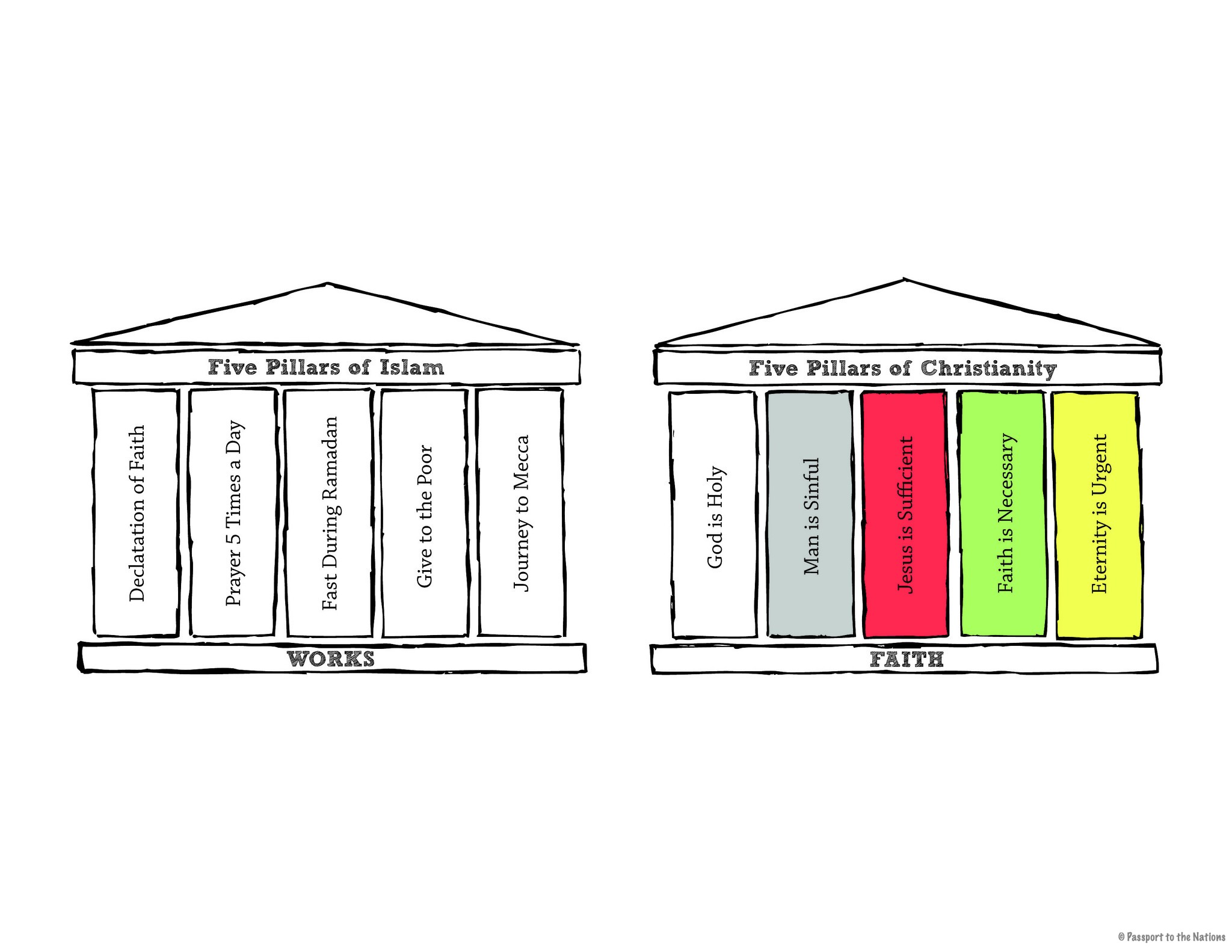5 Pillars of Islam
An understanding of Islam often begins with learning about the five basic beliefs of Islam, often called the Five Pillars of Islam. This can be contrasted with the foundational beliefs of the Christian gospel message. We’ll call these the Five Pillars of Christianity.
This graphic illustrate the tenants of each faith.
The Muslim faith teaches that following the Five Pillars of Islam will earn someone a place in “paradise” (this is the word a Muslim would use in place of heaven). Let’s learn what the five duties of every Muslim are:
- Pray five times each day
- Declare their faith by repeating the call to prayer that we discussed earlier.
- Fast during the month of Ramadan from sun up to sun down.
- Give to the poor.
- Journey to Mecca, Saudi Arabia, the birthplace of Mohammed at least once.
In other words, Muslims believe that if they obey these five pillars (duties), Allah will have mercy on them and they will earn entrance in to paradise (or heaven).
Five Pillars of Christianity
Let’s contrast this with what we will call the Five Pillars of Christianity (the Gospel):
A comprehensive explanation of the Five Pillars of Christianity is available for download here.
1. God is holy.
- God is the holy, just and gracious creator of all things.
- Because of his holiness, God cannot dwell with sin.
2. Man is sinful.
We are each created by God, but we are all corrupted by sin.
- We have rebelled against God.
- We are separated from God.
- We are dead without God.
3. Christ is sufficient
Jesus alone is able to remove our sin and restore us to God.
- He lived the life we could not live.
- He died the death we deserve to die.
- He conquered the enemy we cannot conquer.
4. Faith is necessary.
We can be restored to God only through faith in Jesus.
- We turn from our sin and ourselves.
- We trust in Jesus as Savior and Lord.
5. Eternity is urgent.
Our eternal destiny hinges on our response to Jesus.
- Hell is a dreadful reality for those who turn from Jesus.
- Heaven is a glorious reality for those who trust in Jesus.
- Will you turn from Jesus or will you trust in Jesus?
We will end this explanation of Christianity with John 3:16, a verse that is the one of the cornerstone verses of the Christian faith. This verse says,
For God so loved the world, that he gave his only Son, that whoever believes in him should not perish but have eternal life. John 3:16
This verse teaches us that being reconciled to God is based on us responding to God in faith. Unlike Islam and the Koran, the message the Bible teaches is not a works-based message. It is a faith-based message.
This is emphasized in Ephesians 2:8,9.
For by grace you have been saved through faith. And this is not your own doing; it is the gift of God, not a result of works, so that no one may boast. Ephesians 2:8-9
It is interesting to note that these ideas between Christianity and Islam are in stark contrast with each other.
The bottom line is this: Islam is a faith based on a dead prophet. Christianity is a faith based on a risen (resurrected) Savior. Testimonies from former Muslims who have converted to Christianity confirm this. They often say that Islam felt like a dead, ritualistic religion with no love and no relationship with their God. What they discover with Christianity is that it is a religion based on love… and the cornerstone of Christianity is restoration to a loving relationship with God.
The good news is that someone who follows the Islamic faith will still read the New Testament. Listen to what Paul wrote in Romans 1 about the effects of the gospel (the Christian message) on our life.
For I am not ashamed of the gospel for it is the power of God for salvation to everyone who believes, to the Jew first and also to the Greek. Romans 1:16
Please take all you have learned about the Islamic faith and use it to help you pray for Muslims. The Bible has the power to change their lives (Romans 1:16), the Holy Spirit can change their hearts (John 16:7-11) and open their eyes to the truth (2 Corinthians 4:4).


